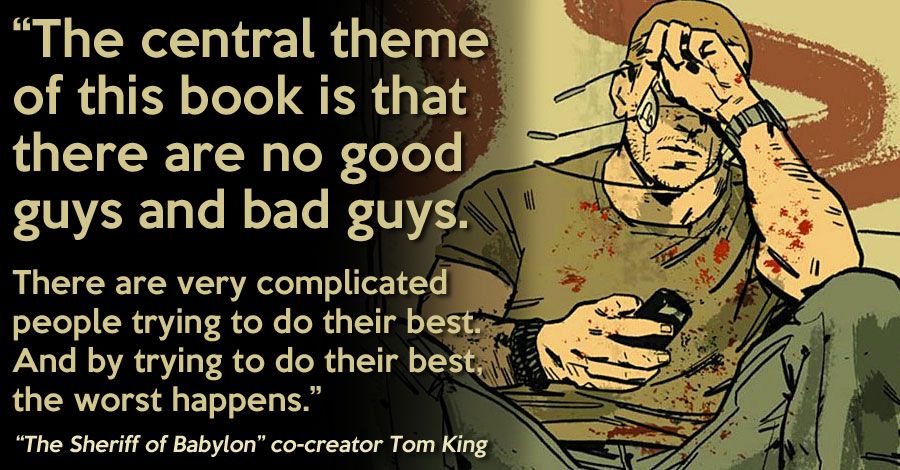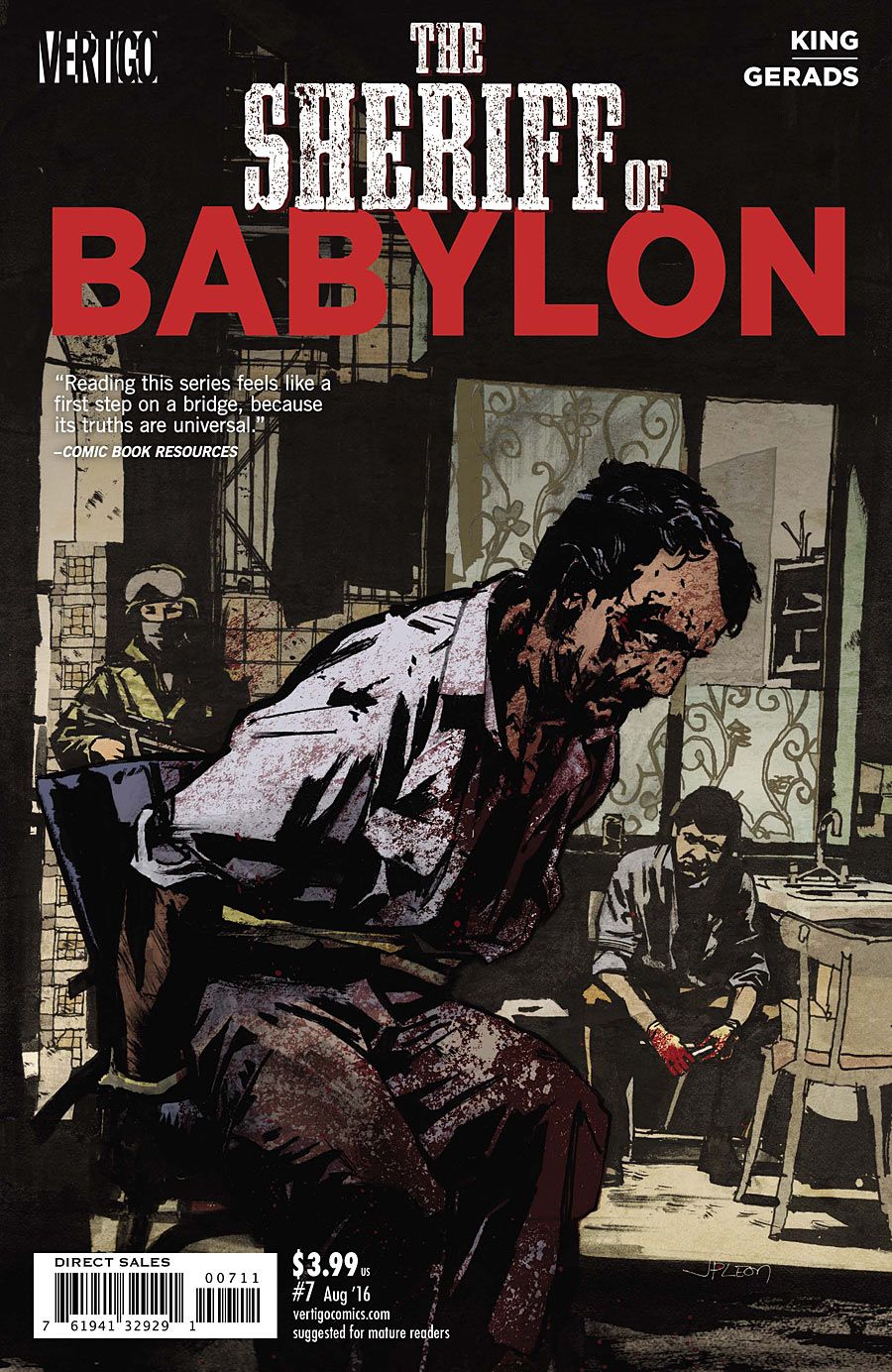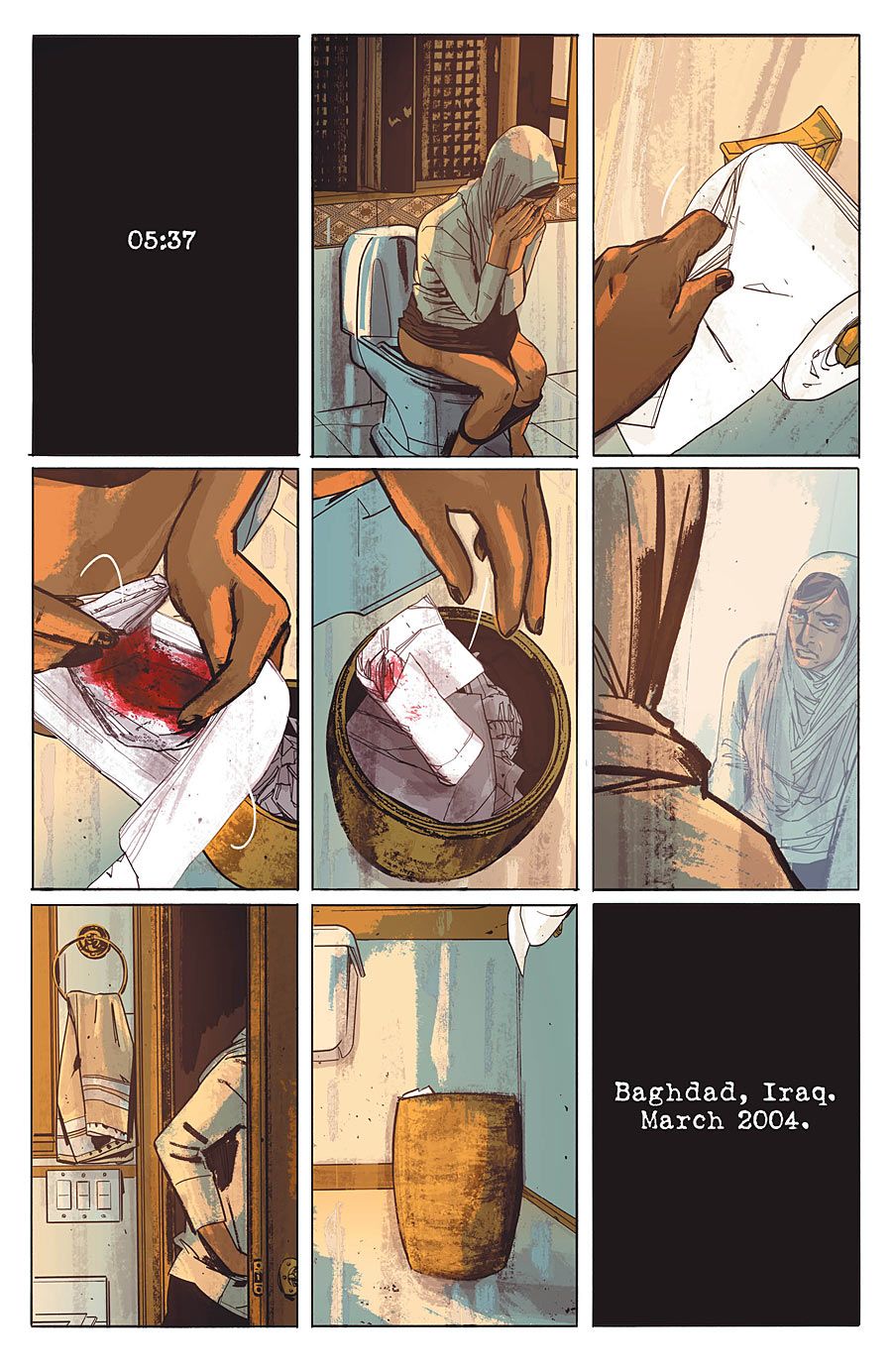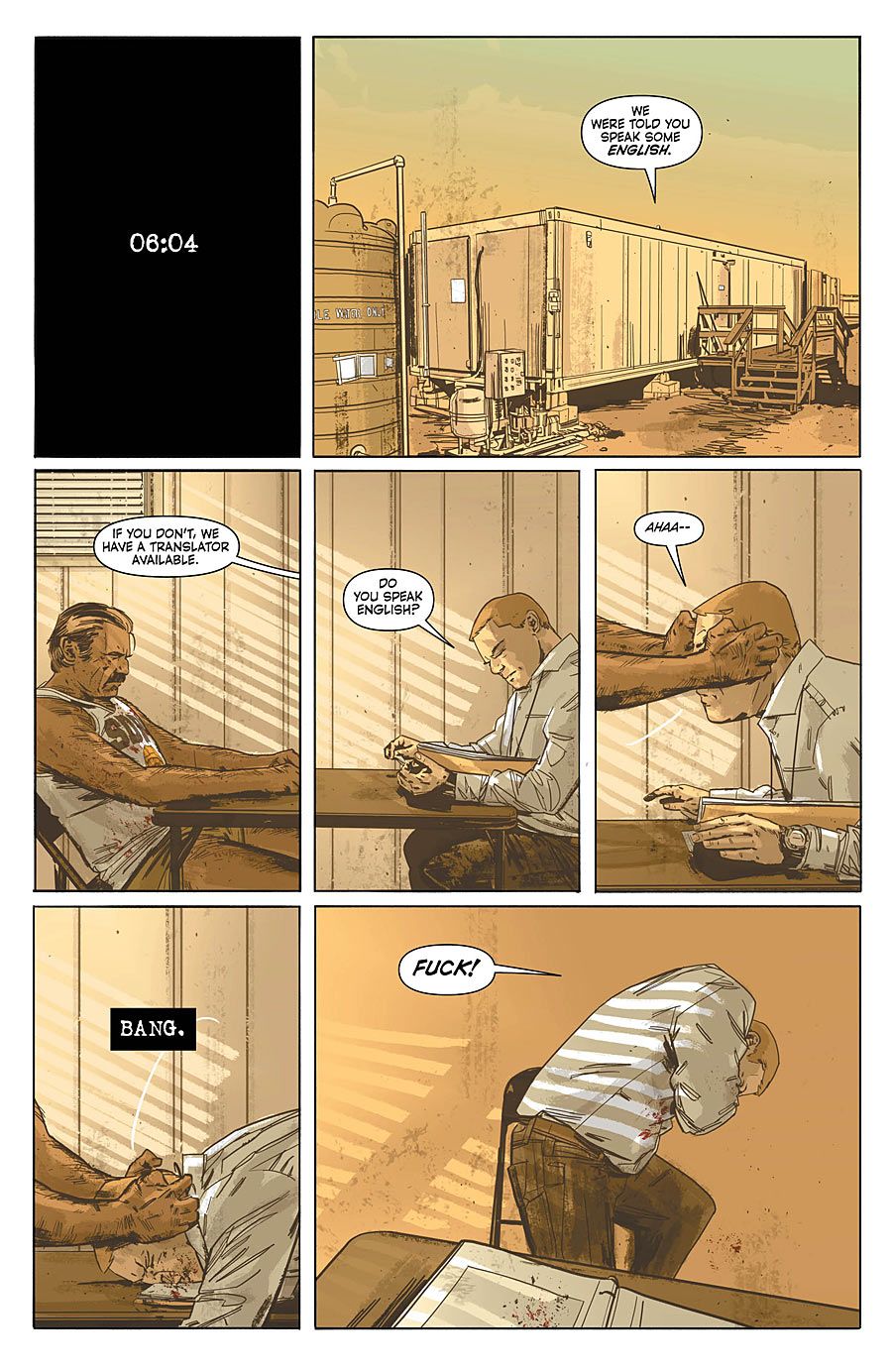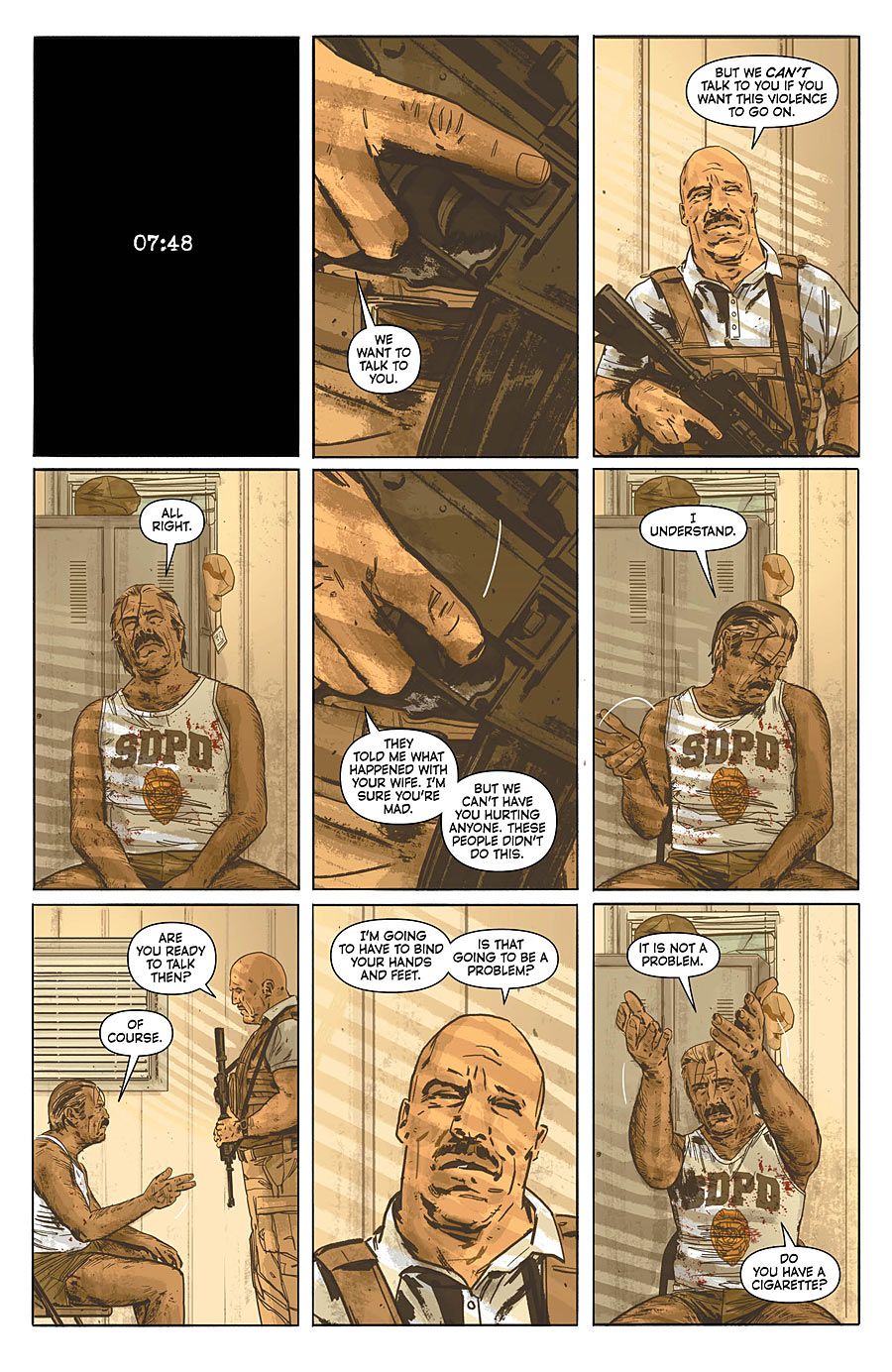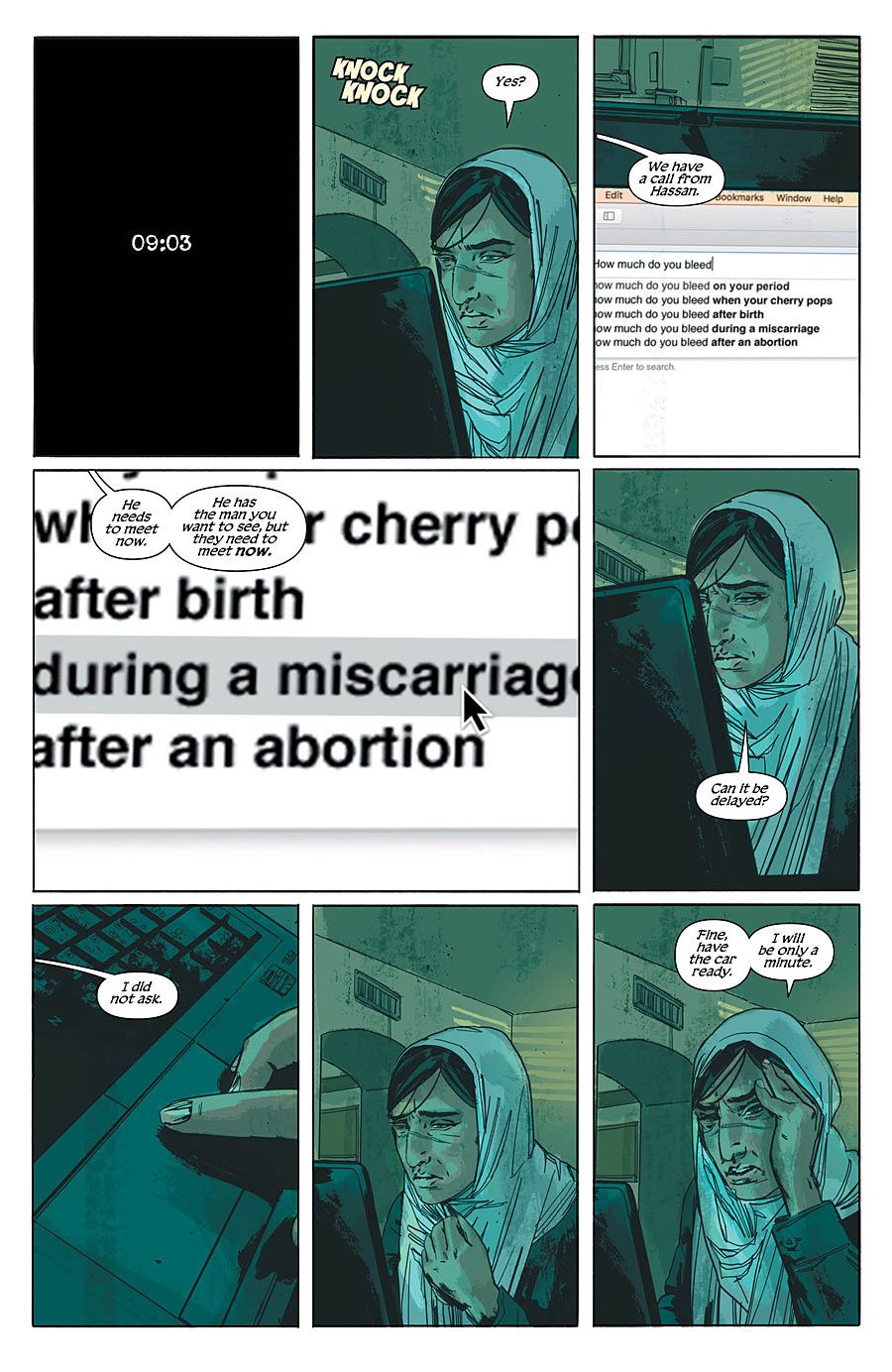Tom King makes headlines as the new writer of "Batman" and his critically acclaimed runs on "The Omega Men" and "The Vision," but it's "The Sheriff of Babylon" where he most amplifies his personal experiences into comic book storytelling.
Illustrated by the newly DC Comics-exclusive Mitch Gerads, the Vertigo series reflects King's former career as a CIA operations officer retold as a wartime crime drama set in post-9/11 Baghdad, Iraq.
RELATED:"Batman: Rebirth" #1 Gives Duke Thomas a New Role, Revamps Classic Foe
"The Sheriff of Babylon," which was recently expanded from an eight-issue miniseries to an ongoing title, follows the exploits of police officer-turned military contractor Chris Henry and his professional and personal relationships with Nassir, the last remaining cop in Baghdad, and Sofia, an Iraqi educated in America who just so happens to run Baghdad's criminal underworld.
CBR News: The series opens with this verse from the Bible: "And the Angel cried mightily with a strong voice saying, 'Babylon the Great is fallen, is fallen, and has become a dwelling place of demons, a prison for every foul spirit, and a cage for every unclean and hated beast!" which is Revelation 18:2. Coming into "The Sheriff of Babylon," I think I may have shared this description, or at least this idea of Iraq in the '90s, but what I've learned from this series is that Babylon is also home to some very clean and no-so-hated beasts, too.
Tom King: Yes, of course. The central theme of this book is that there are no good guys and bad guys. There are very complicated people trying to do their best. And by trying to do their best, the worst happens. That verse basically asking the question, "Who are the beasts of Babylon?" is an interesting one. Are they the Americans? Are they the people there? Are they the contractors? Your assumptions about who they are are going to be broken as the series goes on.
I would agree, because while there is a lot of black and white in this series, there's also a lot of grey in the Green Zone. Enter Chris Henry, a police officer-turned-military contractor. I'm fairly certain that he's a fictional character, but do you know contractors like him, maybe even one in particular that served as his inspiration?
King: I think Chris Henry is based a little bit on me and a little bit on other people that I knew. I did meet a guy out there who was doing police training. That's where the idea came from, this idea that there were people that actually did that job. When I was out there, half of the Green Zone was filled with contractors trying to do just that. These were experts from America who came over to try and remake this country in a different image and succeeded in some ways and failed in others.
Amongst military and government operatives like yourself, what was the general reaction to these contractors?
King: From my own experience, they were so embedded with you that you didn't think of them any differently. I know a lot people viewed them as profiteers, but at the time, a great majority of them were embedded with those serving in the military and really loved their country. These contractors had retired but came back to share their expertise. These are the guys that made your food and even had your back in a gun fight. They wore a different color badge than you, but there was almost no distinction between who was working for the government and who was working for a corporation. This may sound corny and stupid, but at least at the time I was there, they didn't think of themselves as, "I work for a corporation." America's mission was to rebuild Iraq, and they were part of that.
Mitch, while Tom is able to draw from first-hand experiences, how did you do research for this project? Did you visit Iraq? Because your illustrations feel very real and really places the reader right there on the ground.
Mitch Gerads: I live in Arizona, so I feel like I am there already. [Laughs] It's always been something that I have had a deep-seated respect for and interest in. I went into the book with at least a basic knowledge, and then I learned a lot from Tom. I also learned a lot from other guys who were over there. Chris is an important character to me, because I know a lot of Green Berets, and a Green Beret's main focus over there is teaching. A lot of them were teaching and training the new police force and the military force. That all resonates with them, which comes back to me. I am bringing as much respect and as much reality to it as I can. As Americans, very few of us have been there -- including me. We're only given what we're given through the media, and there's a lens on that. It's important to me to show the actual place as it is, as honestly as I can make it.
Sofia has a great line in "The Sheriff of Babylon" #3: "All Americans are cowboys. If we were not, why would we be here." As the key word here is "we," what does this line say about your central figures?
King: There is a sense, and I think it works for both good and bad, that we [Americans] like to think of ourselves as the good guys in very much an old Western movie sort of way. I think that the idea of white hats and black hats is very real, and when 9/11 happened, it was the easiest thing ever to say, "We've been hit. Now we hit back." We were in an old Western movie. There was this idea of justice. If you remember, there were a whole lot of country songs that came out at that time about going and getting the bad guy, and I remember being really inspired by those songs. "Hell, yeah -- we're going to go get the bad guys!" I think that line is a comment on that sense of thinking.
I like how Sofia does say "we" there. I had a big choice to make, whether she says, "we" or "you." Sometimes Sofia thinks of herself as an American, and sometimes she doesn't. She was raised in the U.S. from the time that she was a little girl, but she's an Iraqi at heart. That line really showed her distinct personality and the two worlds that she lives in.
I think you made the right choice. It's a perfect line, and really adds to my depth and understanding of Sofia, who is an incredibly complex character.
King: I agree, man. Thanks. That's why I write -- so I can hear people say that shit. [Laughs]
Another complicated -- and great -- character is Nassir. What makes him tick?
King: On some level, Nassir is the moral center of this whole thing. He's the Clint Eastwood of the whole series. He makes the right decisions, and when things go wrong for him, he tries to react to them in the right way. It's funny -- I talked to Mitch about what I was thinking for Chris and Sofia in terms of look and feel, but he actually went inside my head and pulled out the exact image I had for Nassir. Once I saw that his image matched mine, I knew exactly who Nassir was.
Gerads: Thanks, Tom. Nassir and Fatima are my favorite characters to draw. It started off when I was reading the first script and I was like, "Obviously, Chris is my guy. He's going to be my favorite character." But as I got deeper into the scripts, Nassir really started to shine. Tom never mentioned the Clint Eastwood thing to me, but it came through so much that I gave Nassir the squinty, Clint Eastwood eyes. I gave him all of those qualities without ever hearing that said of the story. A lot of it is that Tom's scripts really spoke to me and the feelings of every character really came out on the page.
Originally, this was solicited as eight-issue series, but it's now an ongoing series. Is there an end to the current story surrounding Abu Rahim? And has your end-game for the series changed now that it's an ongoing?
King: This first story is 12 issues. I've been telling these three stories all at the same time: "Omega Men," "The Vision" and "The Sheriff of Babylon," and I've been thinking of them all as a trilogy. Of those three, this first arc of "Sheriff" has always been clearest in my mind. They gave me eight issues in the beginning because it was part of the Vertigo relaunch and they gave everybody eight issues, so I just said, "Yes." I had the perfect artist and the right opportunity, so I moved ahead. But when "Grayson" got bigger and we started talking about "Batman" and me becoming a DC exclusive, my first ask was to expand "Sheriff" to 12 issues. I knew I could make into something really special if I could do it in 12. If you've read #5 and #6, they were originally plotted to be one issue. But when we moved to 12 issues, we were able to change #5 to what it became, which was just a conversation between two people. It's my favorite comic that I've ever written. DC was nice enough to accommodate that and the audience's reaction to it was huge too.
The first two trades will be one continuous story. This current murder mystery will be resolved in "The Sheriff of Babylon" #12. There will be a resolution but the story will go on.
I'm glad that you mentioned "Batman" and "Grayson." On the Gotham-meter, trademark pending, where does Chris Henry fall between Bruce Wayne and Dick Grayson?
King: [Laughs] I feel like he's 75 percent Grayson. Nobody can touch Bruce Wayne. He wants to be Batman. Batman rarely makes the wrong decisions, and I think that Chris wants to be that guy. But he fails. He can't quite get there because he exists in the "real world," and you can't always be Batman in the real world, so he becomes Dick Grayson every once in a while.
Mitch, Tom spoke about "The Sheriff of Babylon" #5, and I also really liked #4, which opened with a fairy tale/dream sequence recounting the story of Saffiya, the princess who married the sheriff. This series is really letting you flex a whole lot of different muscles as an artist.
Gerads: I agree. I was just talking to my wife about this last night. I hate using this term, but #blessed. [Laughs] "Sheriff" is right in my wheelhouse. It's something that I'm totally interested in and something that I have a lot of respect for. The scripts are amazing. Working with Tom is great. Everything just kind of fell into place where I get to do the perfect book for me. This is exactly where I should be. I am humbled by that every day, to be this early in my career and be exactly where I should be.
Tom: Which sucks for me, because I am begging him to work on "Batman." [Laughs] David Finch is awesome, but "Batman" is double-shipping, so we're going to need some help.
Gerads: You never know. [Laughs]
"The Sheriff of Babylon" #7 by Tom King and Mitch Gerads, is available now.

